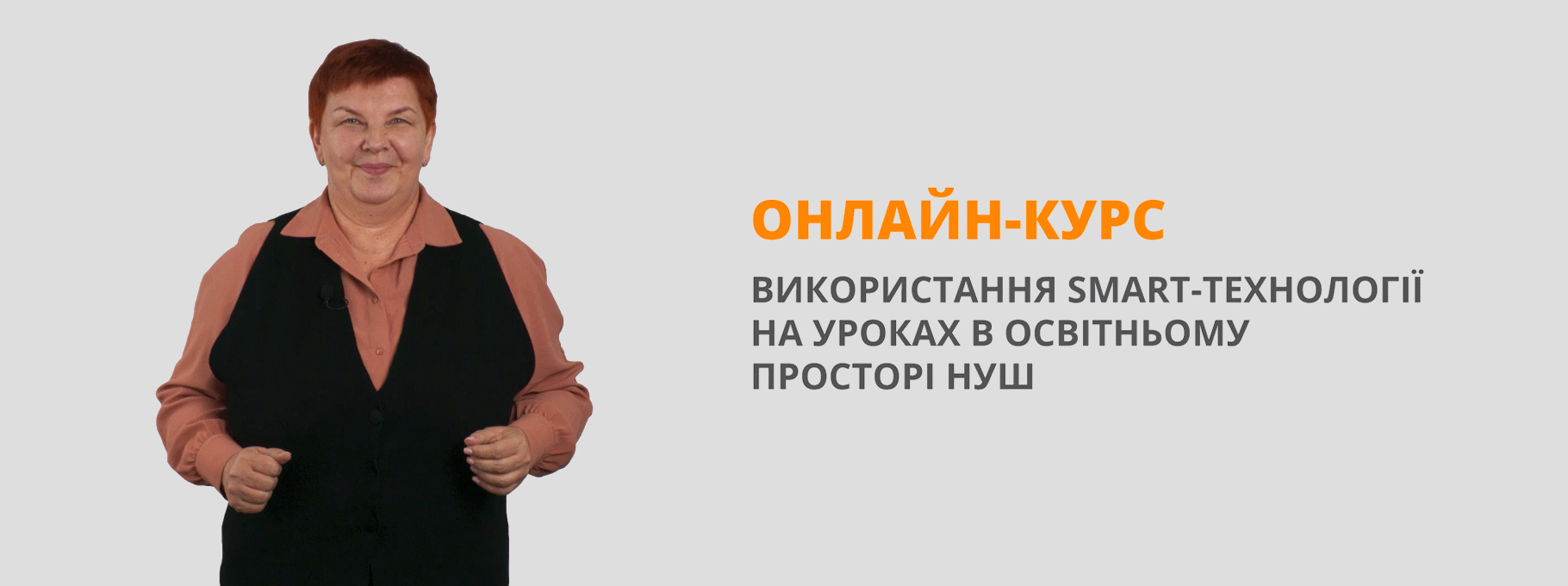Problems, facing young people in Ukraine. Проблеми молоді в Україні.
Topic: Problems, facing young people in Ukraine. Проблеми молоді в Україні.
Цілі заняття: організувати тренування спілкування з незвичайної ситуації з використанням мовленнєвих кліше, раніше вивченого матеріалу та життєвого досвіду студентів; формувати уявлення про життя молоді у країні; розвивати навички аудіювання, письма, читання, говоріння та розумову діяльність студентів на рівні вільного застосування; культуру почуттів і спілкування; сприяти вихованню пошани до батьків та друзів, волі, настирливості в подоланні життєвих труднощів.
Обладнання: роздавальний матеріал, мультимедійна дошка.
Тип заняття: практичне.
Plan
I The Beginning of the class (5min)
- Introduction (2 min)
- Presentation of the topic (3min), (Slide 1)
II The Main Part (35min)
- Brainstorming (2min)
- Making a Diagram (3 min), (Slide 2-11)
- The Communicative Game “Tick-Talk” (7 min), (Slide 12-14)
- Critical Reading. Critical Thinking (6min)
- Watching a film (7min), (Slide 15)
- Group work. Speaking (5min), (Slide 16)
- Personality quiz (3min), (Slide 17)
- Making “Anti-smoking” Poster (2 min), (Slide 18)
III The Conclusion (5 min)
- Closure Evaluation
- Home Assignments
- Comments
Procedure
I The Beginning of the class (2 min)
1.Introduction
Teacher:
-Good afternoon, my undergraduates!
-I am glad to see you.
-How are you?
- When you graduate from our Pedagogical School you’ll understand that the time of your independent life has come. You’ll have to do everything yourselves. You are to pass your serious examination of your abilities and character.
2. Presentation of the topic (3 min)
Teacher:
-What is the independent life? Let’s recollect Mother Teresa’s Message, reciting one line after another one by one. By the way, what do you know about Mother Teresa?
Students:

-
Life is an opportunity, benefit from it.
Life is a beauty, admire it.
Life is a dream, realize it.
Life is a challenge, meet it
Life is a duty, complete it.
Life is a game, play it.
Life is a promise, fulfill it.
Life is sorrow, overcome it.
Life is a song, sing it.
Life is a struggle, accept it.
Life is a tragedy, confront it.
Life is an adventure, dare it.Life is luck, make it.
Life is life, fight for it! - --- Mother Teresa
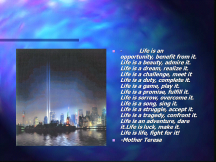
(The students are reciting this message one by one pronouncing one line after another)
Teacher:
-Thank you. I hope you’ve learnt from this message our life is full of advantages and disadvantages. I want you to live a full, interesting and useful life.
II The main Part
1. Brainstorming (2 min)
Teacher:
-Everybody says that youth is the best time of your life. Do you agree with it? Why?
Students:
- Brainstorm ideas.
Teacher:
- What does it mean “being young”?
Students:
- Brainstorm ideas.
2. Making a Diagram (3 min)
Teacher:
-Things are not easy nowadays even for adults, but for young people who have to find their own place in the society, it’s very difficult so youth is the most difficult time, isn’t it? What are the problems of youth? How can we divide them? Let’s make a diagram.
Emotional Problems Global problems
![]()
![]() the relationship with parents unemployment
the relationship with parents unemployment
![]()
![]()
![]() the relationship with friends youth smoking
the relationship with friends youth smoking
![]()
![]()
![]() the relationship with a girl-friend Drugs
the relationship with a girl-friend Drugs
the relationship with a boy-friend raping , AIDs
pregnancies at early age
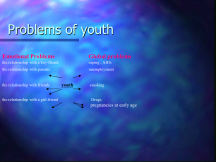
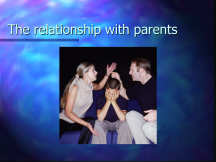
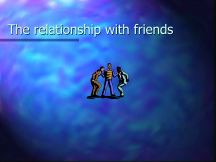
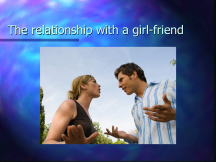
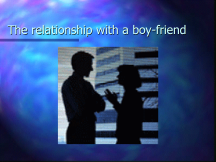
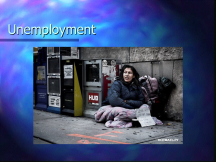
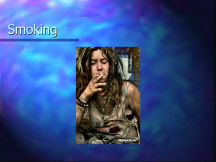
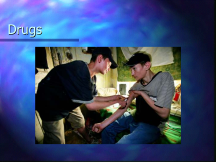
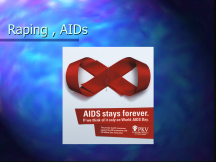

I hope you’ve remembered the problems of youth rather well. Look at pictures and guess what problems are being illustrated.
- What problem are the most essntial for our students of this college?
- I agree with you. Our students mostly have problems with their parents and friends, speaking about emothiional ones.
- And what about global pronlems?
- Of course, it’s smoking. Beides, the number of smoking girls is greater than that one of boys in our college. Now let’s touch these problems and find the way ouy; doing some exerses.
- Match each start of a sentence 1-7 with its ending A-G.
1.We are impossibly busy trying A) that make family life explosive
2.Our parents are suddenly B)whether we are popular, having a
3.There is the difference between our own and our parents’ priorities good social , life or going out with
4.Many parents don’t worry too much about friends .
5.The Bible says: C) to get homework done, playing
6.Children should understand in the match , looking our best for
7.The major problem is connected our new noyfriend or girlfriend .
your father and your motherDFD ffffDDDDDyhhjfduijfdijfjfrjgfvujgfvcujuuuuiui DDddhhghhjnyfhngfgg
D) expecting more help us at home
with many domestic duties.
E)that their parents are wiser and they
know what it is the best for their children.
F)with pocket money.
G)” Honour your father and your mother”
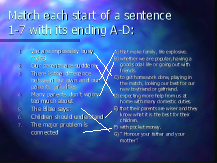
- Thank’s.You ‘ve been quite good at it. I believe this information will be useful for you while discussing the problem of different generations.
- Now, we’ll learn more about teen agers’ problems, putting the phrases of every sentenceinto the correct order.
1. different from / being a/ teenagers /I think /when my / teenager today / is very / parents were /.
I think a teenager today is very different from when my parents were teenagers.
2. ways we / freedom today /In some /have more /.
In some ways we have more freedom today.
3. other ways / life is / But in / and difficult / more complicated /.
But in other ways life is more complicated and difficult.
4. a lot / I feel / today put / on teenagers / of pressure / that parents /.
I feel that parents today put a lot of pressure on teenagers.
5. not / every teenager / It is / the best / to be / possible for /.
It is not possible for every teenager to be the best.
6. feel I / space / Sometimes I / some / just need /.
Sometimes I feel I just need some space.
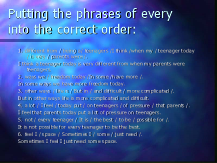
- I want you to value your friends and friendship. Our next task will help us do it. Use only one word in each gap to coplete yhe sentences.
1. I believe friendship ___ always be ___important part of ___ lives.
will/should/must, an, our.
2. A good friend ___ someone ___ you can really trust.
is, that/who.
3.I love my parents, ___ course, but I spend more time ___ friends.
of, with.
4.I prefer ___ have a few close friends ___ a lot of acquaintances.
to, than.
5. When my brother met ___ girlfriend, he stopped spending time ___ his friends.
his, with.
6.I hope to stay ___ touch with all my friends when I’m ___ university.
in, at.
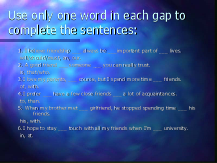
- Well done .Do you know what essential traits of character a good friend should possess.Let’s put the letters into the correct order and find them out.
1 rounhu h___ humour
2 centileligen I___intelligence
3 stonehy h___ honesty
4 yotally l____ loyaltyСлайд 9
5 taipence p____ patience
6 skinnes k_____ kindness
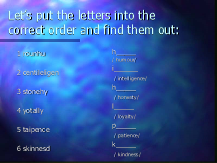
3. The Communicative Game “Tick-Tack” (7min)
-Look at our diagram and recall the emotional and global problems. What problems concern you most of all?
- Let’s stand up, make a circle and discuss it playing the game “Tick-Tack”. The rules of the game are: if I say “tick” you should turn to your left neighbor and speak, then I’ll invite some speaker in front of our circle and you’ll represent your talk, If I say “tack” you should turn to your neighbor and discuss the next problem. After it be ready as well to represent it in front of your groupmates. If I say “tick-tack” together you are to exchange places and continue our game.
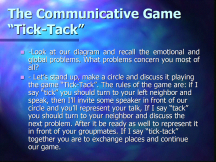
Situation 1: What emotional problems do young people and you have at our Pedagogical School? How can we avoid them?
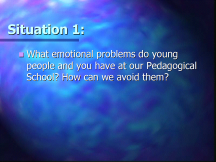
Situation 2: What global problems exist among young people in Ukraine? Give your ideas to overcome them.
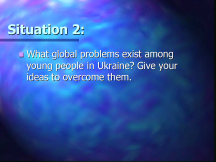
Teacher: Thank you. As for as I’ve understood the problem of fathers and sons (parents and children) is the most serious. You want to be independent and your parents to listen to your opinion and not to interfere in your private life. Besides, your parents and you often have different points of you. But you should find a compromise and remember the Bible says: “Honour your father and your mother”. My advice is that you should respect your parents, because they are wiser know what is the best thing for their children.
4. Critical Reading. Critical Thinking.
Teacher: Another problem of the youth is their relationship with their friends.
a) Pre-Reading Activities (2 min)
Teacher: Friends quarrel because of rumours very often. Now I’ll show you how rumours are spread. I’ll whisper a word to some of you. This person has to whisper my message to the next one very quickly and so on. You mustn’t ask your neighbor to repeat this word.
Teacher: Is the message the same or different from the original. Now you see how rumours can appear. (the original message – “century”)
b) Reading Activities (2 min)
Teacher: We are going to read the text “When Friends Fight”, point out and explain grammar structures and discuss it. I want you to remember the word “to blab” – to tell secret information to someone.
c) Post-Reading Activities (2 min)
Teacher: Discuss, please: “What would you do if you were in this situation?” But now I want to exchange your partners. You should match the beginning and the ending of the proverbs and find your partner. So what’s your proverb? (and yours).
5. Watching the film.
a) Pre-watching activity (2 min)
One of the global problems is raping. Raping is a sex crime, isn’t it? Does it happen in our country (town)? What’s the punishment for a raper? Girls, you should be careful.
b) Watching the film (2 min)
Now, let’s watch the episode from the film and discuss it.
c) Post-watching activity (3 min)
Answer my questions:
- What family has been shown?
- What have you learnt about the girl’s Dad?
- What can you tell me about the relationship between Kelly and her Mummy?
- Why has the girl crying?
- How can we avoid raping?
6. Group Work. Speaking.
a) Discussing the problem of drugs (3 min)
Teacher: You are sure to support me if I say the most serious problem is drugs. What is drug? What is a psychoactive suspense? What drugs do you know?
Teacher: 32% say they’ve tried drugs one time because of curiousity, friends’ influence, the wish to relax or to become “cool”. Is it so?
Students’ ideas on the problem
Do you know any addicts in your street? What is your attitude to them?
b) Discussing the problem of smoking (2 min)
Teacher Smoking isn’t less problematic, is it?
Now agree or disagree with my statements.
Statements:
- Smoking is dangerous.
- Smoking is a waste of money.
- Smoking makes people smell bad.
- Smoking makes people’s teeth turn yellow.
- Not smoking is cool.
- Smoking is an expensive habit.
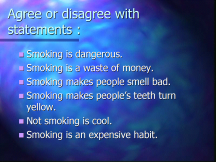
7. Personality Quiz “Playing with Fire”
- Do you now everything about cigarettes or are you playing with fire? Try this test and say if these statements are true or false.
Correct answer Quiz “Playing with Fire”
1+
2-
3+
4-
5+
6+
7+
8+
Count your score and let’s analyze the results.
Less than 2 wrong. Congratulation. You know much about smoking.
3 or 4 wrong. You need to know more about nicotine.
5 or 6 wrong. You must learn much about the danger of smoking.
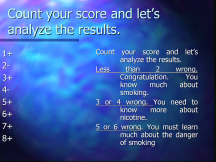
8. Making Anti-Smoking Poster
- Let’s make “anti-smoking” poster to help young people give up smoking.
- Come up to my table, take a paper stripe with the utterance written on it, say if you agree with it and stick it on our poster.
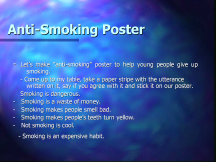
Topic: Problems, facing young people in Ukraine. Проблеми молоді в Україні.
Цілі заняття: організувати тренування спілкування з незвичайної ситуації з використанням мовленнєвих кліше, раніше вивченого матеріалу та життєвого досвіду студентів; формувати уявлення про життя молоді у країні; розвивати навички аудіювання, письма, читання, говоріння та розумову діяльність студентів на рівні вільного застосування; культуру почуттів і спілкування; сприяти вихованню пошани до батьків та друзів, волі, настирливості в подоланні життєвих труднощів.
Обладнання: роздавальний матеріал, мультимедійна дошка.
Тип заняття: практичне.
Plan
I The Beginning of the class (5min).
1. Introduction (2 min).
2. Presentation of the topic (3min).
II The Main Part (33min)
1. Brainstorming (2min).
2. Making a Diagram (3 min).
3. The Communicative Game “Tick-Talk” (5min).
4. Critical Reading. Critical Thinking (9min).
5. Watching a film (6 min).
6. Group work. Speaking (5 min).
7. Making “Anti-smoking” Poster (2 min).
III The Conclusion (2 min)
1. Closure Evaluation
2. Home Assignments
3. Comments
Procedure
I The Beginning of the class (2 min)
1.Introduction
Teacher:
-Good afternoon, my undergraduates!
-I am glad to see you.
-How are you?
- When you graduate from our Pedagogical School you’ll understand that the time of your independent life has come. You’ll have to do everything yourselves. You are to pass your serious examination of your abilities and character.
2. Presentation of the topic (3 min)
Teacher:
-What is the independent life? Let’s recollect Mother Teresa’s Message, reciting one line after another one by one. By the way, what do you know about Mother Teresa?
Students:

-
Life is an opportunity, benefit from it.
Life is a beauty, admire it.
Life is a dream, realize it.
Life is a challenge, meet it
Life is a duty, complete it.
Life is a game, play it.
Life is a promise, fulfill it.
Life is sorrow, overcome it.
Life is a song, sing it.
Life is a struggle, accept it.
Life is a tragedy, confront it.
Life is an adventure, dare it.Life is luck, make it.
Life is life, fight for it! - --- Mother Teresa

(The students are reciting this message one by one pronouncing one line after another)
Teacher:
-Thank you. I hope you’ve learnt from this message our life is full of advantages and disadvantages. I want you to live a full, interesting and useful life.
II The main Part
1. Brainstorming (2 min)
Teacher:
-Everybody says that youth is the best time of your life. Do you agree with it? Why?
Students:
- Brainstorming ideas.
Teacher:
- What does it mean “being young”?
Students:
- Brainstorming ideas.
2. Making a Diagram (3 min)
Teacher:
-Things are not easy nowadays even for adults, but for young people who have to find their own place in the society, it’s very difficult so youth is the most difficult time, isn’t it? What are the problems of youth? How can we divide them? Let’s make a diagram.
Emotional Problems Global problems
![]()
![]() the relationship with parents unemployment
the relationship with parents unemployment
![]()
![]()
![]() the relationship with friends youth smoking
the relationship with friends youth smoking
![]()
![]()
![]() the relationship with a girl-friend Drugs
the relationship with a girl-friend Drugs
the relationship with a boy-friend raping , AIDs
pregnancies at early age
I hope you realize the problems of youth rather well. Look at pictures and guess what problems are being illustrated. Comment on them.










3. The Communicative Game “Tick-Tack” (7min)
-Look at our diagram and recall the emotional problems. What problems concern you most of all?
- Let’s stand up, make a circle and discuss it playing the game “Tick-Tack”. The rules of the game are: if I say “tick” you should turn to your left neighbor and speak, then I’ll invite some speakers in front of our circle and you’ll represent your talk. If I say “talk” you should turn to your right neighbor and discuss the next problem. After you are ready you are to represent it in front of your groupmates. When I say “tick-talk” together you are to exchange places and continue our game.
Situation 1: What emotional problems with parents can young people and you have ?
Situation 2: Is it possible to get rid of the problems you have with your parents? What is the way out?
Teacher: Thank you. As far as I’ve understood the problem of fathers and sons (parents and children) is the most serious. You want to be independent and desire your parents to share your opinion and not to interfere in your private life. Besides, your parents and you often have different points of you. But you should find a compromise and remember the Bible says: “Honour your father and your mother”. My advice is that you should respect your parents, because they are wiser and know what is the best thing for their children.
4. Critical Reading. Critical Thinking.
Teacher: Another problem of the youth is their relationship with their friends.
a) Pre-Reading Activities (2 min)
Teacher: Friends quarrel because of rumours very often. Now I’ll show you how rumours are spread. I’ll whisper a word to some of you. This person has to whisper my message to the next one very quickly and so on. You mustn’t ask your neighbor to repeat this word.
Teacher: Is the message the same or different from the original. Now you see how rumours can appear. (the original message – “century”)
b) Reading Activities (2 min)
Teacher: We are going to read the text “When Friends Fight”, point out and explain grammar structures and discuss it. I want you to remember the word “to blab” – to tell secret information to someone.
c) Post-Reading Activities (5 min)
1.Teacher: Discuss, please: “What would you do if you were in this situation?” But now I want to exchange your partners. You should match the beginnings and the endings of the proverbs and find your partner. So what’s your proverb?
2.I want you to value your friends and friendship. Our next task will help us do it. Use only one word in each gap to coplete yhe sentences.
1. I believe friendship ___ always be ___important part of ___ lives.
will/should/must, an, our.
2. A good friend ___ someone ___ you can really trust.
is, that/who.
3.I love my parents, ___ course, but I spend more time ___ friends.
of, with.
4.I prefer ___ have a few close friends ___ a lot of acquaintances.
to, than.
5. When my brother met ___ girlfriend, he stopped spending time ___ his friends.
his, with.
6.I hope to stay ___ touch with all my friends when I’m ___ university.
in, at.

3. Well done .Do you know what essential traits of character a good friend should possess.Let’s put the letters into the correct order and find them out.
1 rounhu h___ humour
2 centileligen I___intelligence
3 stonehy h___ honesty
4 yotally l____ loyaltyСлайд 9
5 taipence p____ patience
6 skinnes k_____ kindness
7

5. Watching the film.
a) Pre-watching activity (2 min)
- Well done. You are quite good at discussing emotional problems. Now it is time to touch the essentional global ones. One of the global problems is raping. Raping is a sex crime, isn’t it? Does it happen in our country (town)? What’s the punishment for a raper? It is awful when girls or women are raped.
And it is nightmare when babies are raped.
b) While -watching activity (2 min)
Now, let’s watch the video- fragment and see who was raped and under what circumstances.
c) Post-watching activity (2 min)
Answer my questions:
- Who and what is the raper?
- How old is he?
- Whom did he rape?
- What story did he make up for the police?
- What evidences proved that the baby had been raped?
6. Group Work. Speaking.
a) Discussing the problem of drugs (3 min)
Teacher: You are sure to support me if I say the most serious problem is drugs. What is drug? What is a psychoactive suspense? What drugs do you know?
Teacher: 32% say they’ve tried drugs one time because of curiousity, friends’ influence, the wish to relax or to become “cool”. Is it so?
Students’ ideas on the problem
Do you know any addicts in your street? What is your attitude to them?
b) Discussing the problem of smoking (2 min)
Teacher Smoking isn’t less problematic, is it?
Now agree or disagree with my statements.
Statements:
- Smoking is dangerous.
- Smoking is a waste of money.
- Smoking makes people smell bad.
- Smoking makes people’s teeth turn yellow.
- Not smoking is cool.
- Smoking is an expensive habit.

7. Making Anti-Smoking Poster
- Let’s make “anti-smoking” poster to help young people give up smoking.
- Come up to my table, take a paper stripe with the utterance written on it, say if you agree with it and stick it on our poster.
III The Conclusion (5 min)
- Closure Evaluation
- Home Assignments
- Comments


про публікацію авторської розробки
Додати розробку
